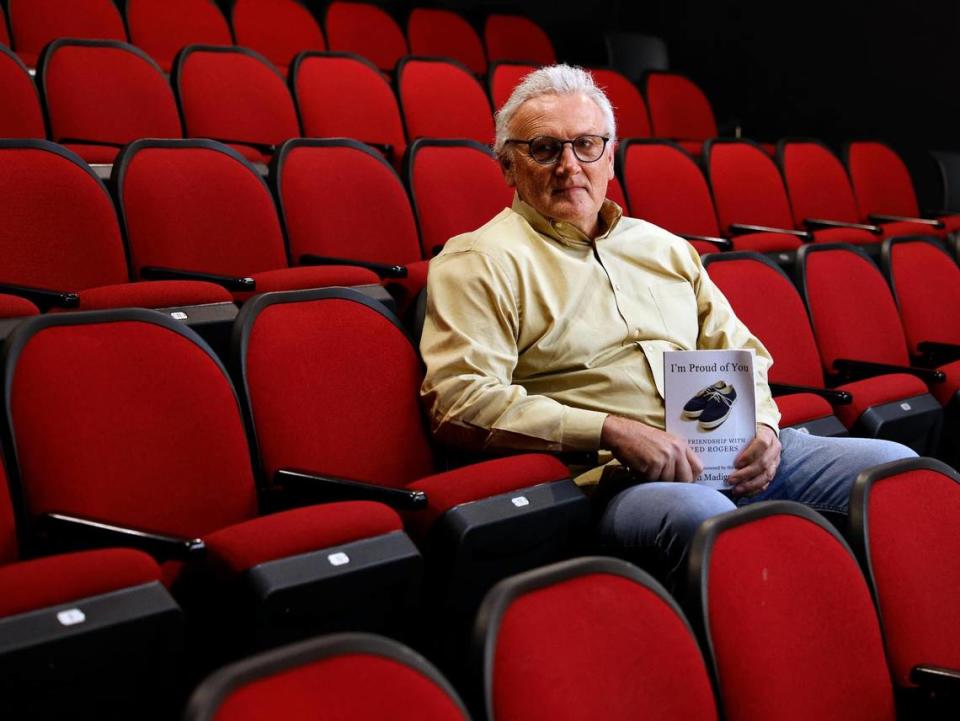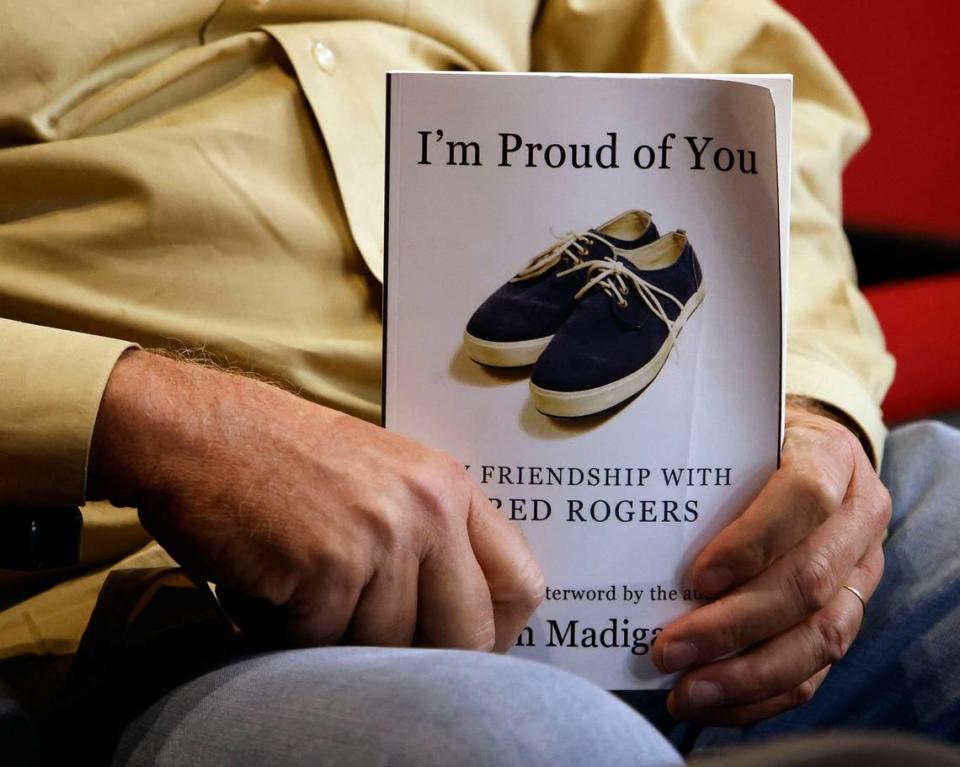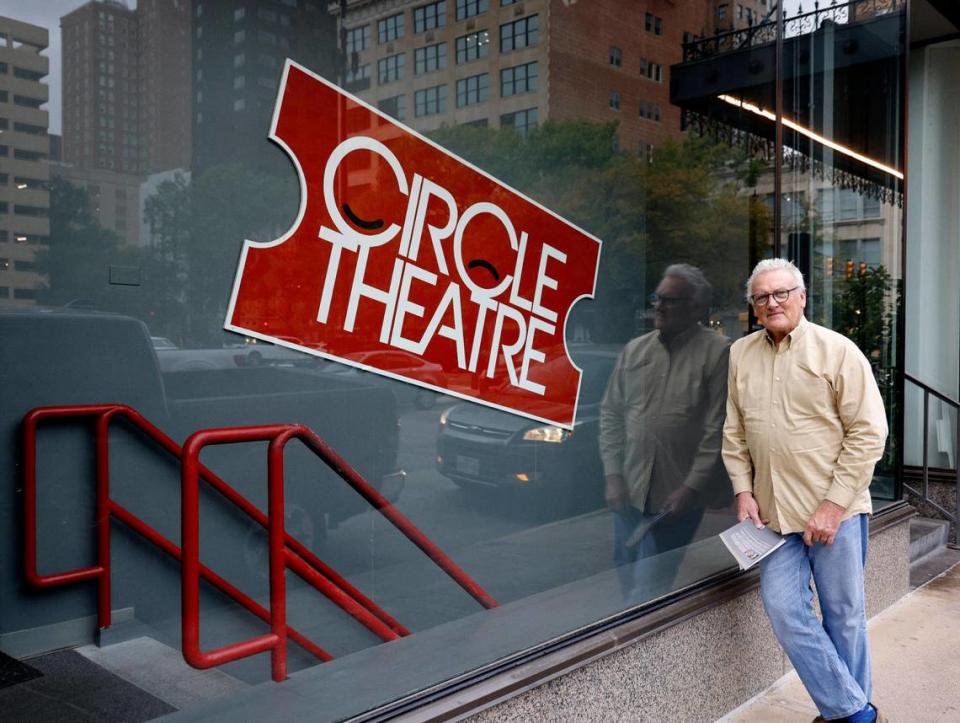Play based on Fort Worth author’s bestseller recalls friendship with Mr. Rogers
- Oops!Something went wrong.Please try again later.
A story about violence on television led Tim Madigan to a friendship with one of the kindest people ever to grace a TV screen.
Somewhere, the late Fred Rogers must be smiling at the irony.
The story of their special friendship was put into print with Madigan’s best-selling book “I’m Proud of You: My Friendship With Fred Rogers.” Now, it has been adapted into a play by Madigan and acclaimed local director and TCU professor Harry Parker, who is also helming this production, and will be presented for the first time at Fort Worth’s Circle Theatre Oct. 26-Nov. 11.
“It’s surreal. It kind of came out of the blue,” Madigan, 65, said of the show. “The book had a nice run.
“It’s such a personal story to me. On the one hand it’s excruciating, on the other, it’s beautiful. These memories are 3-dimensional now.
“But I’m very glad it is getting shared onstage, and I believe it will affect anyone who sees it in a positive way.”

How it began
Madigan knew Fred Rogers away from the TV spotlight. They instantly clicked when meeting on a routine assignment for Madigan, who was then working at the Star-Telegram.
In 1995, Madigan was working on a story about violence on TV and the effect it has on children. A co-worker suggested he interview longtime kids’ show host Captain Kangaroo and, of course, Mr. Rogers.
Once the piece was written and printed, Madigan thought that was that. However, Rogers liked the story and had his people invite Madigan to Pittsburgh for a few days to write a profile on him.
That is where the friendship began. They clicked and Madigan made several more trips to Pittsburgh.
“Fred said, ‘I’m so glad we’re friends,’” Madigan recalled. “We became best friends at a time I was really hurting. He mentored me, supported me through some painful stuff. And I was there for some painful stuff in his life.”
Looking back, Madigan said he has wondered over the years how the friendship blossomed, all the while happy that it did. After all, he asked himself, why was he special when Rogers had friends and admirers across the globe?
“I think he made that invitation to thousands of people. Maybe I’m just one who took him up on it,” Madigan said with a smile.
The friendship lasted and grew until Rogers’ death in 2003. Madigan said though it was only eight years, they impacted him as if it had been decades.

‘I’m proud of you’
Being a half a country apart, much of the friendship was fostered through correspondence. Rogers loved receiving and sending letters.
In the summer of 1996 Madigan, battling what he termed a bout of “life-threatening depression,” reached out to his good friend with a special request. Among the challenges he was facing, he said it seemed no matter what he did he could not get his father to say he was proud of him.
So, he explicitly asked Rogers, “Would you be proud of me?”
Rogers’ reply? A resounding “Yes!” He told Madigan he had been proud of him since they first met.
From that moment on, anytime the two communicated, Rogers would always end with “I’m proud of you.”
Hence, the name of the book and now the play.

Reunion with estranged brother
During their time as friends, Madigan experienced a reunion with his estranged brother, Steve, who had contracted lung cancer. Only a year apart in age, Steve and Tim were once close before the separation.
It was Rogers who helped reunite the two. When Tim asked his friend how he should communicate with his brother after not doing so for a decade, Rogers’ answer was simple and to the point.
“Fred said, ‘Go to your brother. Let God handle the rest,’” Tim said, adding that Steve’s reaction to the reunion was, “like someone opened up a window and let in fresh air.”
As Steve fought his cancer — which eventually took his life — Rogers, in his humble and loving wisdom, noted, “Steve’s teaching us all now.”
“Through me, Fred started working on everyone else, too,” Tim said.
Rogers had a daily prayer list that was known to be lengthy. He would spend every morning going through name by name praying for each person on the list individually.
“Steve and his wife and children were on Fred’s daily prayer list,” Madigan said. “If he knew you he was praying for you.”
Bringing book to the stage
Madigan is no stranger to having his work adapted for other purposes. His acclaimed novel “The Burning: The Tulsa Race Massacre of 1921,” a definitive account of America’s worst episode of racial violence, was primary source material for the depiction of the massacre in the pilot episode of the Emmy-winning series, “Watchmen” on HBO.
The story of him and Rogers is embedded in Madigan’s heart with an emotional depth that Parker felt needed to be told to audiences immediately. Parker had read the book and couldn’t get it out of his mind. The more he pondered it, the more he believed it was a play waiting to be written — so he invited Madigan to lunch and pitched him the idea.
“He didn’t know me, but I so appreciate that he trusted me, and said, ‘Give it a shot,’” Parker remembered. “When I showed him my first draft he said, ‘This could work — let’s work on it together.’” Collaborating on the project with him, first as a writer, and now as the show’s director has been a lot of work, but a complete joy.
“The story is simple, but the truths it contains are profound and meaningful and universal. It’s so easy to forget what is really important in life, but this play is a reminder that, among other things, ‘what is essential is invisible to the eyes,’ “ he said, referring to a quote from the late famous writer Antoine de Saint-Exupéry.
Madigan said by the spring of 2022 it began to feel as if they were closing on a solid production for the stage. Then, after some actor friends read it, he realized fully what Parker had been championing.
“When we heard it come out of the actors’ mouths, we knew,” Madigan said. “Almost everything I was going through so many people can relate to. Harry’s theory is I was the proxy for everybody.”
Circle Theatre Executive Tim Long agrees with Parker that Madigan’s story is one that was meant for the stage — and he knew just which stage on which it should make its debut. His, of course.
“When a friend like Harry Parker says he is writing a play, you listen and ask what it is about. Harry’s directed some of the finest productions during my time at Circle Theatre,” Long said. “When he tells you the play is about a local Fort Worth Star-Telegram reporter, Tim Madigan, one you read and followed, and Mr. Madigan’s friendship with the beloved Fred Rogers, you listen even more intently.
“You add these ingredients together and you realize something is cooking. Stir in some wonderful actors like Randy Pearlman and Richie Haratine (as Madigan), and you now have a recipe for a wonderful evening of theater.”
Seeing his life before him
Madigan admits seeing his life and relationships played out in front of him is something unlike anything he’s experienced before.
“I feel like I’m naked onstage for 90 minutes,” he said with a laugh.
Even more emotional is seeing Steve portrayed, he said.
“It’s complicated, emotionally difficult in some ways, but the overriding emotion is gratitude,” Madigan said. “How many people have the opportunity to have their brother come back to life.
“Gabe (Whitehurst) does such a remarkable job. I see and hear him and I think, ‘Oh my God, that’s Steve!’ There he is, with a little imagination I can see my brother up there.”
And there’s the moment when he relives Rogers’ response to the question that inspired the show’s title.
“Randy (Pearlman) is giving passionate responses about me asking him to be proud of me. I told him it’s like I’m hearing this for the first time,” Madigan said.
Though Madigan didn’t have a hand in choosing the cast, he said he couldn’t be more pleased.
“Harry picked them. He saw that a certain kind of person was required,” Madigan said. “But he’s that kind of person, it’s part of why he’s a great director.”
Madigan admits he was a little uncomfortable at first with the thought of folks in the audience being able to pick apart certain aspects of his life. Such thoughts were put to rest, however, by Parker.
“He told me, ‘When people are leaving the theater they are not going to be thinking about you. They’re going to be thinking about their own lives,’” Madigan recalled. “We all suffer.”
Long-term potential
Parker believes the show has the potential to play beyond Circle Theatre.
“First, there is still enormous interest in Fred Rogers. He touched many people in his career, and many remember him very fondly. But, even more important than Fred’s story, is the universality of the play’s message,” Parker said. “This is a play that reminds us of things that we always need to be reminded of.”
Parker said he hopes the audiences learn what Madigan learns in the play — that we need to pay attention to the important things in our life, and learn how to be vulnerable and honest.
“If we can soften the hardened heart of one audience member during a performance, wouldn’t that be an incredible result? I think so,” he said.
“Working on this play has been such a joy for all of us. Tim and I have become true friends, and I cherish that. I was able to cast four actors who are not only ideal for the roles they are playing, but are all superb professionals and fantastic, genuine people.
“I hope the audience enjoys seeing the play as much as we have enjoyed creating it.”
Fred Rogers’ lasting impact
“I always wondered if he would ever betray himself to be more recognizably human,” Madigan said. “He never did.
“He had a deep understanding of humanity, one thing was how difficult life can be. Things beneath the surface are things people try to hide.”
Madigan said Rogers’ approach was to, instead, bring those things to the surface. He believed that suffering is human, not a character defect.
“Share that and you’re giving another person a great compliment, showing that you trust them,” Madigan said.
The message of the book and play reflect that, Madigan said.
“It’s OK. What you’re going through is OK,” he said, pausing momentarily as if to collect himself and his memories.
Rogers always assumed there was more to a person than meets the eye, and he always followed that assumption with compassion. Madigan said this was evidenced in how he looked beyond the surface in the relationships Madigan had with his father and brother.
“He had boundaries, but he would never judge,” Madigan said.
And when Rogers passed away, Madigan felt a void in his life, while at the same time having the satisfaction of being in a special friendship that does not come through everyone’s life. While the world mourned a lost TV icon and great humanitarian, Madigan remembers, “He was that guy to others, but to me he was my great friend.”
‘I’m Proud of You’
When: Oct. 26-Nov. 18 (7:30 p.m. Thursdays, 8 p.m. Fridays, 3 p.m. and 8 p.m. Saturdays)
Where: Circle Theatre, 230 W. Fourth St.
Tickets: circletheatre.com/improudofyou

